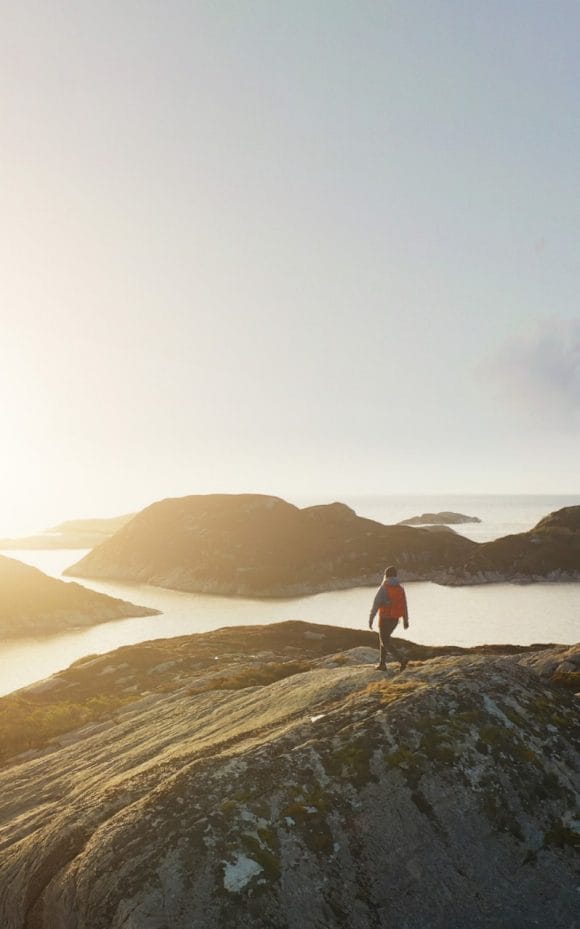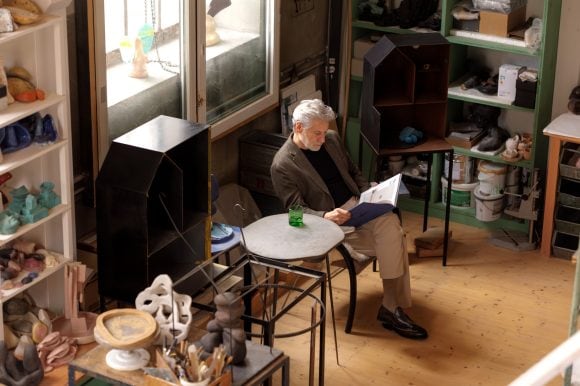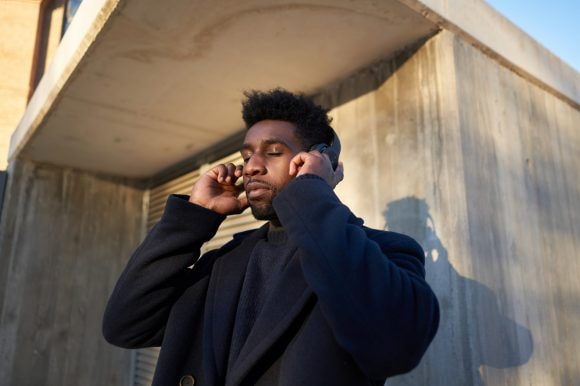At a glance
People and planet, as well as profit
People and planet, as well as profit
Trading up to impact economics means recognising the economic value of people and the planet. Our needs include equal opportunity, fair treatment, and an environment that is not collapsing. Impact economics aims to allocate scarce resources to meet all of those needs.


Emerging from the data sludge
Emerging from the data sludge
The impact economy works when peoples’ needs are properly, transparently measured. This is necessarily more complex than reducing everything to a single statistic like GDP, but must be more simple than the current murky swamp of acronyms and conflicting measures.
Impact economics – an economic evolution
Impact economics – an economic evolution
Economics has had one job throughout the ages – to find the best way to allocate scarce resources between people’s endless needs. Over the past eighty years the focus has been output economics, which assumed peoples’ needs were things they could buy. But people’s needs have evolved, so output economics needs to evolve into impact economics.

Videos
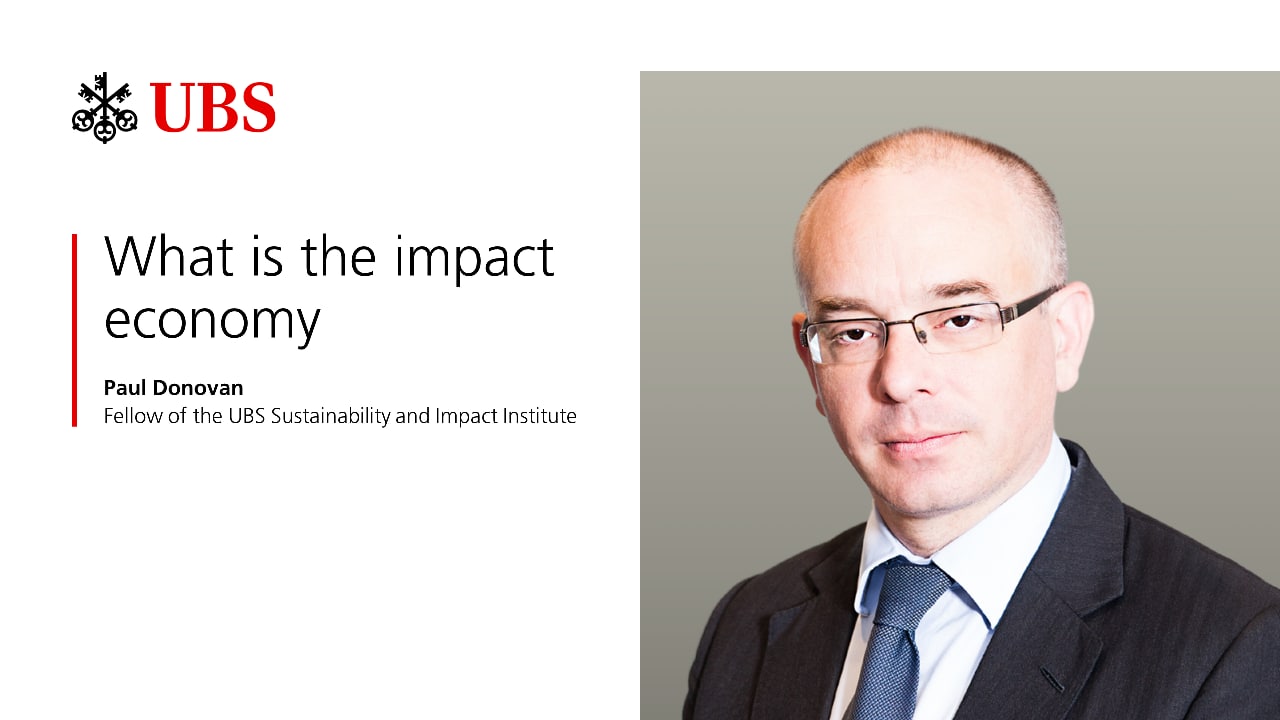
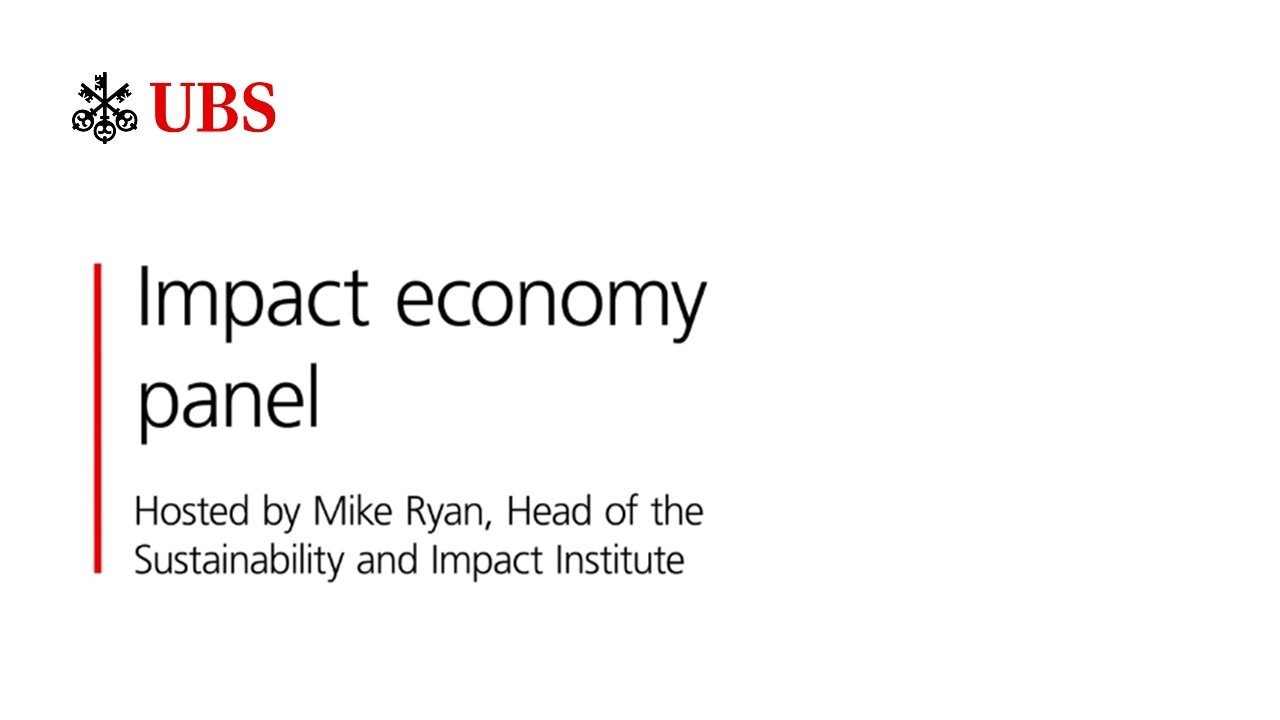
Podcast
The Bulletin with UBS on “The rise of the impact economy”
Monocle
Discussions on why the exclusive focus on GDP needs to broaden for a more sustainable economic development.

25 May 2023
The impact economy. Fiona Reynolds and Paul Donovan on the shortcomings of GDP
This is the second if a two-part series exploring the impact economy. Fiona Reynolds, CEO of Conexus Financial, and UBS Global Wealth Management chief economist Paul Donovan discuss the shortcomings of GDP, why we need an impact economy and what needs to happen to bring one about.

25 May 2023
The impact economy. Prof. Sir Partha Dasgupta on the economics of biodiversity
This is the first of a two-part series exploring the impact economy. Sir Partha Dasgupta, Professor Emeritus of Economics at the University of Cambridge, discusses the interconnectedness of a flourishing natural environment, economic growth and human development. Much of Sir Partha’s celebrated research has covered ecological economics.
Discover more insights
Important information
This material has been prepared by UBS AG, its subsidiary or affiliate (“UBS”). This material and the information contained herein are provided solely for information purposes. It is not to be regarded as investment advice, investment research, sales prospectus, an offer or a solicitation of an offer to enter in any investment activity. It has no regard to the specific investment objectives, financial situation or particular needs of any specific recipient. The information contained in this material is as of the date hereof only and is subject to change without notice. UBS is under no obligation to update or keep current the information contained herein. This material is not a complete statement of the markets and developments referred to herein. The information contained herein should not be regarded by recipients as a substitute for the exercise of their own judgment. Prior to entering into a transaction you should consult with your own legal, regulatory, tax, financial and accounting advisers to the extent you deem necessary to make your own investment, hedging and trading decisions. UBS does not provide legal or tax advice and makes no representations as to the tax treatment of assets or the investment returns thereon, either in general or with reference to specific client’s circumstances and needs. Certain services and products are subject to legal provisions and cannot be offered world-wide on an unrestricted basis. In particular, this material is not intended for distribution into jurisdictions where its distribution by UBS would be restricted. UBS specifically prohibits the redistribution or reproduction of this material in whole or in part without the written permission of UBS and UBS accepts no liability whatsoever for the actions of third parties in this respect. Neither UBS nor any of its directors, officers, employees or agents accepts any liability for any loss or damage arising out of the use of all or any part of this material. Source of all information is UBS unless otherwise stated. UBS makes no representation or warranty relating to any information herein which is derived from independent sources. The views and opinions expressed in this material by third parties are not those of UBS. Accordingly, UBS does not accept any liability over the content shared by third parties or any claims, losses or damages arising from the use or reliance of all or any part thereof.
Important Information About Sustainable Investing Strategies: Sustainable investing strategies aim to consider and incorporate environmental, social and governance (ESG) factors into investment process and portfolio construction. Strategies across geographies and styles approach ESG analysis and incorporate the findings in a variety of ways. Incorporating ESG factors or Sustainable Investing considerations may inhibit UBS’s ability to participate in or to advise on certain investment opportunities that otherwise would be consistent with the Client’s investment objectives. The returns on a portfolio consisting primarily of sustainable investments may be lower or higher than portfolios where ESG factors, exclusions, or other sustainability issues are not considered by UBS, and the investment instruments available to such portfolios may differ. Companies, product issuers and/or manufacturers may not necessarily meet high performance standards on all aspects of ESG or Sustainable Investing issues.
Bahrain: UBS is a Swiss bank not licensed, supervised or regulated in Bahrain by the Central Bank of Bahrain to undertake banking or investment business activities in Bahrain. Therefore, prospects/clients do not have any protection under local banking and investment services laws and regulations. Brazil: This publication is only intended for Brazilian residents who are directly purchasing or selling securities in the Brazil capital market through a local authorized institution. Canada: The information contained herein is not, and under no circumstances is to be construed as, a prospectus, an advertisement, a public offering, an offer to sell securities described herein, solicitation of an offer to buy securities described herein, in Canada or any province or territory thereof. Any offer or sale of the securities described herein in Canada will be made only under an exemption from the requirements to file a prospectus with the relevant Canadian securities regulators and only by a dealer properly registered under applicable securities laws or, alternatively, pursuant to an exemption from the dealer registration requirement in the relevant province or territory of Canada in which such offer or sale is made. Under no circumstances is the information contained herein to be construed as investment advice in any province or territory of Canada and is not tailored to the needs of the recipient. To the extent that the information contained herein references securities of an issuer incorporated, formed or created under the laws of Canada or a province or territory of Canada, any trades in such securities must be conducted through a dealer registered in Canada or, alternatively, pursuant to a dealer registration exemption. No securities commission or similar regulatory authority in Canada has reviewed or in any way passed upon these materials, the information contained herein or the merits of the securities described herein and any representation to the contrary is an offence. In Canada, this publication is distributed by UBS Investment Management Canada Inc.. China: This document and any offering material such as term sheet, research report, other product or service documentation or any other information (the "Material") sent with this document was done so as a result of a request received by UBS from you and/or persons entitled to make the request on your behalf. Should you have received the Material erroneously, UBS asks that you kindly delete it and inform UBS immediately. This document is prepared by UBS Switzerland AG or its offshore subsidiary or affiliate (collectively as "UBS Offshore"). UBS Offshore is an entity incorporated out of China and is not licensed, supervised or regulated in China to carry out banking or securities business. The recipient should not contact UBS Offshore or authors who produced this report for advice as they are not licensed to provide securities investment advice in China. The recipient should not use this document or otherwise rely on any of the information contained in this document in making investment decisions and UBS takes no responsibility in this regard. Czech Republic: UBS is not a licensed bank in the Czech Republic and thus is not allowed to provide regulated banking or investment services in the Czech Republic. This communication and/or material is distributed for marketing purposes and constitutes a "Commercial Message" under the laws of the Czech Republic in relation to banking and/or investment services. Please notify UBS if you do not wish to receive any further correspondence. Denmark: This publication is not intended to constitute a public offer under Danish law. It is distributed only for information purposes to clients of UBS Europe SE, Denmark Branch, filial af UBS Europe SE, with place of business at Sankt Annae Plads 13, 1250 Copenhagen, Denmark, registered with the Danish Commerce and Companies Agency, under No. 38 17 24 33. UBS Europe SE, Denmark Branch, filial af UBS Europe SE is subject to the joint supervision of the European Central Bank, the German Central Bank (Deutsche Bundesbank), the German Federal Financial Services Supervisory Authority (Bundesanstalt für Finanzdienstleistungsaufsicht, "BaFin"), as well as of the Danish Financial Supervisory Authority (Finanstilsynet), to which this publication has not been submitted for approval. UBS Europe SE is a credit institution constituted under German law in the form of a Societas Europaea, duly authorized by BaFin. Egypt: Securities or other investment products are not being offered or sold by UBS to the public in Egypt and they have not been and will not be registered with the Egyptian Financial Regulatory Authority (FRA). France: This publication is not intended to constitute a public offer under French law, it does not constitute a personal recommendation as it is distributed only for information purposes to clients of UBS (France) S.A., French "société anonyme" with share capital of € 132.975.556, at 69 boulevard Haussmann F-75008 Paris, registered with the “Registre du Commerce et des Sociétés” of Paris under N° B 421 255 670. UBS (France) S.A. is a provider of investment services duly authorized according to the terms of the "Code monétaire et financier", regulated by French banking and financial authorities as the "Autorité de contrôle prudentiel et de résolution" and "Autorité des marchés financiers", to which this publication has not been submitted for approval. Germany: This publication is not intended to constitute a public offer under German law. It is distributed only for information purposes to clients of UBS Europe SE, Germany, with place of business at Bockenheimer Landstrasse 2-4, 60306 Frankfurt am Main. UBS Europe SE is a credit institution constituted under German law in the form of a Societas Europaea, duly authorized by the German Federal Financial Services Supervisory Authority (Bundesanstalt für Finanzdienstleistungsaufsicht, "BaFin") and supervised jointly by the European Central Bank, the German Central Bank (Deutsche Bundesbank) and the BaFin, to which this publication has not been submitted for approval. Hong Kong SAR: This publication is distributed to clients of UBS AG Hong Kong Branch by UBS AG Hong Kong Branch, a licensed bank under the Hong Kong Banking Ordinance and a registered institution under the Securities and Futures Ordinance. UBS AG Hong Kong Branch is incorporated in Switzerland with limited liability. India: Distributed by UBS Securities India Private Ltd. (Corporate Identity Number U67120MH1996PTC097299) 2/F, 2 North Avenue, Maker Maxity, Bandra Kurla Complex, Bandra (East), Mumbai (India) 400051. Phone: +912261556000. It provides brokerage services bearing SEBI Registration Number INZ000259830; merchant banking services bearing SEBI Registration Number: INM000010809 and Research Analyst services bearing SEBI Registration Number: INH000001204. UBS AG, its affiliates or subsidiaries may have debt holdings or positions in the subject Indian company/companies. UBS AG, its affiliates or subsidiaries may have financial interests (e.g. like loan/derivative products, rights to or interests in investments, etc.) in the subject Indian company/companies from time to time. Within the past 12 months, UBS AG, its affiliates or subsidiaries may have received compensation for non-investment banking securities-related services and/or non-securities services from the subject Indian company/companies. The subject company/companies may have been a client/clients of UBS AG, its affiliates or subsidiaries during the 12 months preceding the date of distribution of this publication with respect to investment banking and/or non-investment banking securities-related services and/or non-securities services. With regard to information on associates, please refer to the Annual Report at: https://www.ubs.com/global/en/about_ubs/investor_relations/annualreporting.html. Indonesia: This communication and any offering material term sheet, research report, other product or service documentation or any other information (the "Material") sent with this communication was done so as a result of a request received by UBS from you and/or persons entitled to make the request on your behalf. Should you have received the Material erroneously, UBS asks that you kindly delete the e-mail and inform UBS immediately. The Material, where provided, was provided for your information only and is not to be further distributed without the consent of UBS. None of the Material has been registered or filed under the prevailing laws and with any financial or regulatory authority in your jurisdiction. The Material may not have been approved, disapproved, endorsed, registered or filed with any financial or regulatory authority in your jurisdiction. UBS has not, by virtue of the Material, made available, issued any invitation to subscribe for or to purchase any investment (including securities or products or futures contracts). The Material is neither an offer nor a solicitation to enter into any transaction or contract (including futures contracts) nor is it an offer to buy or to sell any securities or products. The relevant investments will be subject to restrictions and obligations on transfer as set forth in the Material, and by receiving the Material you undertake to comply fully with such restrictions and obligations. You should carefully study and ensure that you understand and exercise due care and discretion in considering your investment objective, risk appetite and personal circumstances against the risk of the investment. You are advised to seek independent professional advice in case of doubt. Any and all advice provided on and/or trades executed by UBS pursuant to the Material will only have been provided upon your specific request or executed upon your specific instructions, as the case may be, and may be deemed as such by UBS and you. Israel: UBS is a premier global financial firm offering wealth management, asset management and investment banking services from its headquarters in Switzerland and its operations in over 50 countries worldwide to individual, corporate and institutional investors. In Israel, UBS Switzerland AG is registered as Foreign Dealer in cooperation with UBS Wealth Management Israel Ltd., a wholly owned UBS subsidiary. UBS Wealth Management Israel Ltd. is an Investment Marketing licensee which engages in Investment Marketing and is regulated by the Israel Securities Authority. This publication is intended for information only and is not intended as an offer to buy or solicitation of an offer. Furthermore, this publication is not intended as an investment advice. No action has been, or will be, taken in Israel that would permit an offering of the product(s) mentioned in this document or a distribution of this document to the public in Israel. In particular, this document has not been reviewed or approved by the Israeli Securities Authority. The product(s) mentioned in this document is/are being offered to a limited number of sophisticated investors who qualify as one of the investors listed in the first supplement to the Israeli Securities Law, 5728-1968. This document may not be reproduced or used for any other purpose, nor be furnished to any other person other than those to whom copies have been sent. Anyone who purchases the product(s) mentioned herein shall do so for its own benefit and for its own account and not with the aim or intention of distributing or offering the product(s) to other parties. Anyone who purchases the product(s) shall do so in accordance with its own understanding and discretion and after it has received any relevant financial, legal, business, tax or other advice or opinion required by it in connection with such purchase(s). The word "advice" and/or any of its equivalent terms shall be read and construed in conjunction with the definition of the term "investment marketing" as defined under the Israeli Regulation of Investment Advice, Investment Marketing and Portfolio Management Law. Italy: This publication is not intended to constitute a public offer under Italian law. It is distributed only for information purposes to clients of UBS Europe SE, Succursale Italia, with place of business at Via del Vecchio Politecnico, 3-20121 Milano. UBS Europe SE, Succursale Italia is subject to the joint supervision of the European Central Bank, the German Central Bank (Deutsche Bundesbank), the German Federal Financial Services Supervisory Authority (Bundesanstalt für Finanzdienstleistungsaufsicht, "BaFin"), as well as of the Bank of Italy (Banca d’Italia) and the Italian Financial Markets Supervisory Authority (CONSOB - Commissione Nazionale per le Società e la Borsa), to which this publication has not been submitted for approval. UBS Europe SE is a credit institution constituted under German law in the form of a Societas Europaea, duly authorized by BaFin. Jersey: UBS AG, Jersey Branch, is regulated and authorized by the Jersey Financial Services Commission for the conduct of banking, funds and investment business. Where services are provided from outside Jersey, they will not be covered by the Jersey regulatory regime. UBS AG, Jersey Branch is a branch of UBS AG a public company limited by shares, incorporated in Switzerland whose registered offices are at Aeschenvorstadt 1, CH-4051 Basel and Bahnhofstrasse 45, CH 8001 Zurich. UBS AG, Jersey Branch's principal place of business is 1, IFC Jersey, St Helier, Jersey, JE2 3BX. Luxembourg: This publication is not intended to constitute a public offer under Luxembourg law. It is distributed only for information purposes to clients of UBS Europe SE, Luxembourg Branch ("UBS Luxembourg"), R.C.S. Luxembourg n° B209123, with registered office at 33A, Avenue J. F. Kennedy, L-1855 Luxembourg. UBS Europe SE is a credit institution constituted under German law in the form of a Societas Europaea (HRB n° 107046), with registered office at Bockenheimer Landstrasse 2-4, D-60306 Frankfurt am Main, Germany, duly authorized by the German Federal Financial Services Supervisory Authority (Bundesanstalt für Finanzdienstleistungsaufsicht, "BaFin") and subject to the joint prudential supervision of BaFin, the European Central Bank and the central bank of Germany (Deutsche Bundesbank). UBS Luxembourg is furthermore supervised by the Luxembourg prudential supervisory authority (Commission de Surveillance du Secteur Financier), in its role as host member state authority. This publication has not been submitted for approval to any public supervisory authority. Malaysia: This communication and any offering material term sheet, research report, other product or service documentation or any other information (the "Material") sent with this communication was done so as a result of a request received by UBS from you and/or persons entitled to make the request on your behalf. Should you have received the Material erroneously, UBS asks that you kindly delete the e-mail and inform UBS immediately. The Material, where provided, was provided for your information only and is not to be further distributed in whole or in part in or into your jurisdiction without the consent of UBS. The Material may not have been reviewed, approved, disapproved, endorsed, registered or filed with any financial or regulatory authority in your jurisdiction. UBS has not, by virtue of the Material, made available, issued any invitation to subscribe for or to purchase any investment (including securities or derivatives products). The Material is neither an offer nor a solicitation to enter into any transaction or contract (including future contracts) nor is it an offer to buy or to sell any securities or derivatives products. The relevant investments will be subject to restrictions and obligations on transfer as set forth in the Material, and by receiving the Material you undertake to comply fully with such restrictions and obligations. You should carefully study and ensure that you understand and exercise due care and discretion in considering your investment objective, risk appetite and personal circumstances against the risk of the investment. You are advised to seek independent professional advice in case of doubt. Any and all advice provided on and/or trades executed by UBS pursuant to the Material will only have been provided upon your specific request or executed upon your specific instructions, as the case may be, and may be deemed as such by UBS and you. Mexico: This information is distributed by UBS Asesores México, S.A. de C.V. ("UBS Asesores"), an affiliate of UBS Switzerland AG, incorporated as a non-independent investment advisor under the Mexican regulation due to the relation with a Foreign Bank. UBS Asesores is registered under number 30060-001-(14115)-21/06/2016 and subject to the supervision of the Mexican Banking and Securities Commission ("CNBV") exclusively regarding the rendering of (i) portfolio management services, (ii) securities investment advisory services, analysis and issuance of individual investment recommendations, and (iii) anti-money laundering and terrorism financing matters. Such registry does not imply the adherence of UBS Asesores to the regulations applicable to the services it provides, nor the accuracy or veracity of the information provided to its clients. This UBS publication or any material related thereto is addressed only to Sophisticated or Institutional Investors located in Mexico. Monaco: This document is not intended to constitute a public offering or a comparable solicitation under the Principality of Monaco laws, but might be made available for information purposes to clients of UBS (Monaco) SA, a regulated bank having its registered office 2 avenue de Grande Bretagne 98000 Monaco operating under a banking license granted by the “Autorité de Contrôle Prudentiel et de Résolution” (ACPR) and the Monegasque government which authorizes the provision of banking services in Monaco. UBS (Monaco) S.A. is also licensed by the “Commission de Contrôle des Activités Financières” (CCAF) to provide investment services in Monaco. The latter has not approved this publication. Nigeria: The investment products mentioned in this material are not being offered or sold by UBS to the public in Nigeria and they have not been submitted for approval nor registered with the Securities and Exchange Commission of Nigeria. If you are interested in products of this nature, please let us know. The investment products mentioned in this material are not being directed to, and are not being made available for subscription by any persons within Nigeria other than the selected investors to whom the offer materials have been addressed as a private sale or domestic concern within the exemption and meaning of Section 69(2) of the Investments and Securities Act, 2007 (ISA). This material has been provided to you at your specific unsolicited request and for your information only. Philippines: This communication was done so as a result of a request received by UBS from you and/or persons entitled to make the request on your behalf. Should you have received the Material erroneously, UBS asks that you kindly delete the e-mail and inform UBS immediately. The Material, where provided, was provided for your information only and is not to be further distributed in whole or in part in or into your jurisdiction without the consent of UBS. The Material may not have been reviewed, approved, disapproved, endorsed, registered or filed with any financial or regulatory authority in your jurisdiction. UBS has not, by virtue of the Material, made available, issued any invitation to subscribe for or to purchase any investment (including securities or derivatives products). The Material is neither an offer nor a solicitation to enter into any transaction or contract (including future contracts) nor is it an offer to buy or to sell any securities or derivatives products. The relevant investments will be subject to restrictions and obligations on transfer as set forth in the Material, and by receiving the Material you undertake to comply fully with such restrictions and obligations. You should carefully study and ensure that you understand and exercise due care and discretion in considering your investment objective, risk appetite and personal circumstances against the risk of the investment. You are advised to seek independent professional advice in case of doubt. Any and all advice provided on and/or trades executed by UBS pursuant to the Material will only have been provided upon your specific request or executed upon your specific instructions, as the case may be, and may be deemed as such by UBS and you. Portugal: UBS Switzerland AG is not licensed to conduct banking and financial activities in Portugal nor is UBS Switzerland AG supervised by the portuguese regulators (Bank of Portugal "Banco de Portugal" and Portuguese Securities Exchange Commission "Comissão do Mercado de Valores Mobiliários"). Qatar: UBS Qatar LLC is authorized by the Qatar Financial Centre Regulatory Authority, with QFC no. 01169, and has its registered office at 14th Floor, Burj Alfardan Tower, Building 157, Street No. 301, Area No. 69, Al Majdami, Lusail, Qatar. UBS Qatar LLC neither offers any brokerage services nor executes any order with, for or on behalf of its clients. A client order will have to be placed with, and executed by, UBS Switzerland AG in Switzerland or an affiliate of UBS Switzerland AG, that is domiciled outside Qatar. It is in the sole discretion of UBS Switzerland AG in Switzerland or its affiliate to accept or reject an order and UBS Qatar LLC does not have authority to provide a confirmation in this respect. UBS Qatar LLC may however communicate payment orders and investment instructions to UBS Switzerland AG in Switzerland for receipt, acceptance and execution. UBS Qatar LLC is not authorized to act for and on behalf of UBS Switzerland AG or an affiliate of UBS Switzerland AG. This document and any attachments hereto are intended for eligible counterparties and business customers only. Russia: This document or information contained therein is for information purposes only and constitutes neither a public nor a private offering, is not an invitation to make offers, to sell, exchange or otherwise transfer any financial instruments in the Russian Federation to or for the benefit of any Russian person or entity and does not constitute an advertisement or offering of securities in the Russian Federation within the meaning of Russian securities laws. The information contained herein is not an “individual investment recommendation as defined in Federal Law of 22 April 1996 No 39-FZ "On Securities Market" (as amended) and the financial instruments and operations specified herein may not be suitable for your investment profile or your investment goals or expectations. The determination of whether or not such financial instruments and operations are in your interests or are suitable for your investment goals, investment horizon or the acceptable risk level is your responsibility. We assume no liability for any losses connected with making any such operations or investing into any such financial instruments and we do not recommend to use such information as the only source of information for making an investment decision. Saudi Arabia: UBS Saudi Arabia is authorised and regulated by the Capital Market Authority to conduct securities business under licence number 08113-37. Singapore: Clients of UBS AG Singapore branch are asked to please contact UBS AG Singapore branch, an exempt financial adviser under the Singapore Financial Advisers Act (Cap. 110) and a wholesale bank licensed under the Singapore Banking Act (Cap. 19) regulated by the Monetary Authority of Singapore, in respect of any matters arising from, or in connection with, the analysis or report. UBS AG is incorporated in Switzerland with limited liability. UBS AG has a branch registered in Singapore (UEN S98FC5560C). This communication and any offering material term sheet, research report, other product or service documentation or any other information (the "Material") sent with this communication was done so as a result of a request received by UBS from you and/or persons entitled to make the request on your behalf. Should you have received the Material erroneously, UBS asks that you kindly delete the e-mail and inform UBS immediately. The Material, where provided, was provided for your information only and is not to be further distributed in whole or in part in or into your jurisdiction without the consent of UBS. The Material may not have been reviewed, approved, disapproved or endorsed by any financial or regulatory authority in your jurisdiction. UBS has not, by virtue of the Material, made available, issued any invitation to subscribe for or to purchase any investment (including securities or products or futures contracts). The Material is neither an offer nor a solicitation to enter into any transaction or contract (including future contracts) nor is it an offer to buy or to sell any securities or products. The relevant investments will be subject to restrictions and obligations on transfer as set forth in the Material, and by receiving the Material you undertake to comply fully with such restrictions and obligations. You should carefully study and ensure that you understand and exercise due care and discretion in considering your investment objective, risk appetite and personal circumstances against the risk of the investment. You are advised to seek independent professional advice in case of doubt. Any and all advice provided on and/or trades executed by UBS pursuant to the Material will only have been provided upon your specific request or executed upon your specific instructions, as the case may be, and may be deemed as such by UBS and you. Sweden: This publication is not intended to constitute a public offer under Swedish law. It is distributed only for information purposes to clients of UBS Europe SE, Sweden Bankfilial, with place of business at Regeringsgatan 38, 11153 Stockholm, Sweden, registered with the Swedish Companies Registration Office under Reg. No 516406-1011. UBS Europe SE, Sweden Bankfilial is subject to the joint supervision of the European Central Bank, the German Central Bank (Deutsche Bundesbank), the German Federal Financial Services Supervisory Authority (Bundesanstalt für Finanzdienstleistungsaufsicht, "BaFin"), as well as of the Swedish supervisory authority (Finansinspektionen), to which this publication has not been submitted for approval. UBS Europe SE is a credit institution constituted under German law in the form of a Societas Europaea, duly authorized by BaFin. Taiwan: This material is provided by UBS AG, Taipei Branch in accordance with laws of Taiwan, in agreement with or at the request of clients/prospects. Thailand: This communication and any offering material, term sheet, research report, other product or service documentation or any other information (the "Material") sent with this communication were done so as a result of a request received by UBS from you and/or persons entitled to make the request on your behalf. Should you have received the Material erroneously, UBS asks that you kindly delete the e-mail and inform UBS immediately. The Material, where provided, was provided for your information only and is not to be further distributed in whole or in part in or into your jurisdiction without the consent of UBS. The Material may not have been reviewed, approved, disapproved, endorsed, registered or filed with any financial or regulatory authority in your jurisdiction. UBS has not, by virtue of the Material, made available, issued any invitation to subscribe for or to purchase any investment (including securities or derivatives products). The Material is neither an offer nor a solicitation to enter into any transaction or contract (including future contracts) nor is it an offer to buy or to sell any securities or derivatives products. The relevant investments will be subject to restrictions and obligations on transfer as set forth in the Material, and by receiving the Material you undertake to comply fully with such restrictions and obligations. You should carefully study and ensure that you understand and exercise due care and discretion in considering your investment objective, risk appetite and personal circumstances against the risk of the investment. You are advised to seek independent professional advice in case of doubt. Any and all advice provided and/or trades executed by UBS pursuant to the Material will only have been provided upon your specific request or executed upon your specific instructions, as the case may be, and may be deemed as such by UBS and you. Türkiye: The information in this document is not provided for the purpose of offering, marketing or sale of any capital market instrument or service in the Republic of Türkiye. Therefore, this document may not be considered as an offer made, or to be made, to residents of the Republic of Türkiye in the Republic of Türkiye. UBS Switzerland AG is not licensed by the Turkish Capital Market Board (the CMB) under the provisions of the Capital Market Law (Law No. 6362). Accordingly, neither this document nor any other offering material related to the instrument/service may be utilized in connection with providing any capital market services to persons within the Republic of Türkiye without the prior approval of the CMB. However, according to article 15 (d) (ii) of the Decree No. 32 residents of the Republic of Türkiye are allowed to purchase or sell the financial instruments traded in financial markets outside of the Republic of Türkiye. Further to this, pursuant to article 9 of the Communiqué on Principles Regarding Investment Services, Activities and Ancillary Services No. III-37.1, investment services provided abroad to residents of the Republic of Türkiye based on their own initiative are not restricted. United Arab Emirates (UAE): UBS is not a financial institution licensed in the UAE by the Central Bank of the UAE nor by the Emirates’ Securities and Commodities Authority and does not undertake banking activities in the UAE. UBS AG Dubai Branch is licensed by the DFSA in the DIFC. This document is provided for your information only and does not constitute financial advice. United Kingdom: This document is issued by UBS Wealth Management, a division of UBS AG which is authorised and regulated by the Financial Market Supervisory Authority in Switzerland. In the United Kingdom, UBS AG is authorised by the Prudential Regulation Authority and is subject to regulation by the Financial Conduct Authority and limited regulation by the Prudential Regulation Authority. Details about the extent of regulation by the Prudential Regulation Authority are available from us on request. A member of the London Stock Exchange. This publication is distributed to retail clients of UBS Wealth Management. Where products or services are provided from outside the UK, they will not be covered by the UK regulatory regime or the Financial Services Compensation Scheme. Ukraine: UBS is not registered and licensed as a bank/financial institution under Ukrainian legislation and does not provide banking and other financial services in Ukraine. UBS has not made and will not make any offer of the mentioned products to the public in Ukraine. No action has been taken to authorize an offer of the mentioned products to the public in Ukraine and the distribution of this document shall not constitute financial services for the purposes of the Law of Ukraine "On Financial Services and State Regulation of Financial Services Markets" dated 12 July 2001. Any offer of the mentioned products shall not constitute an investment advice, public offer, circulation, transfer, safekeeping, holding or custody of securities in the territory of Ukraine. Accordingly, nothing in this document or any other document, information or communication related to the mentioned products shall be interpreted as containing an offer, a public offer or invitation to offer or to a public offer, or solicitation of securities in the territory of Ukraine or investment advice under Ukrainian law. Electronic communication must not be considered as an offer to enter into an electronic agreement or other electronic instrument within the meaning of the Law of Ukraine "On Electronic Commerce" dated 3 September 2015. This document is strictly for private use by its holder and may not be passed on to third parties or otherwise publicly distributed. USA: As a firm providing wealth management services to clients, UBS Financial Services Inc. offers investment advisory services in its capacity as an SEC-registered investment adviser and brokerage services in its capacity as an SEC-registered broker-dealer. Investment advisory services and brokerage services are separate and distinct, differ in material ways and are governed by different laws and separate arrangements. It is important that clients understand the ways in which we conduct business, that they carefully read the agreements and disclosures that we provide to them about the products or services we offer. For more information, please review the PDF document at ubs.com/relationshipsummary. There are two sources of UBS research. Reports from the first source, UBS CIO Wealth Management Research, are designed for individual investors and are produced by UBS Wealth Management Americas (which includes UBS Financial Services Inc. and UBS International Inc.) and UBS Wealth Management. The second research source is UBS Investment Research, and its reports are produced by UBS Investment Bank, whose primary business focus is institutional investors. The two sources operate independently and may therefore have different recommendations. The various research content provided does not take into account the unique investment objectives, financial situation or particular needs of any specific individual investor. This material is not independent research and not subject to regulatory rules regarding research in the US. This material is intended for educational purposes only. If you have any questions, please consult your Financial Advisor. UBS Financial Services Inc. is a subsidiary of UBS AG and an affiliate of UBS International Inc.
Important information about brokerage and advisory services. As a firm providing wealth management services to clients, UBS Financial Services Inc. offers investment advisory services in its capacity as an SEC-registered investment adviser and brokerage services in its capacity as an SEC-registered broker-dealer. Investment advisory services and brokerage services are separate and distinct, differ in material ways and are governed by different laws and separate arrangements. It is important that you understand the ways in which we conduct business and that you carefully read the agreements and disclosures that we provide about the products or services we offer. For more information, please review client relationship summary provided at ubs.com/relationshipsummary.
UBS Financial Services Inc. does not provide legal or tax advice and this does not constitute such advice. UBS strongly recommends that persons obtain appropriate independent legal, tax, and other professional advice.
© 2023 UBS Financial Services Inc. is a subsidiary of UBS Group AG. Member FINRA/SIPC.
© 2023 UBS AG. The key symbol and UBS are among the registered and unregistered trademarks of UBS. All rights reserved.


